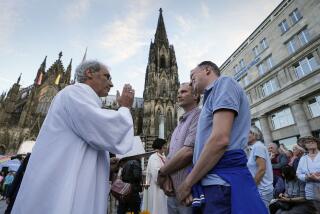Need to Explain Reasons for Celibacy, Vatican Says : U.S. Seminaries Get High Marks From Rome
- Share via
WASHINGTON — The Vatican, in a report this week, generally praised U.S. seminaries preparing men for the Roman Catholic priesthood, but said the schools should place greater stress on explaining the church’s rationale for priestly celibacy.
“Every college seminary is treating formation for priestly celibacy in a responsible way, usually in conference or in special workshops, with follow-up individual spiritual direction,” said the 11-page report signed by Cardinal William Baum, head of the Vatican’s Congregation for Catholic Education.
“However,” the report added, “it seems to us that the theological rationale for celibacy needs to be more systematically and fully presented to the students so that they can appropriate the theological motivation for an asceticism of priestly celibacy based on the example of our Lord himself.”
Causes for Criticism
It also criticized what it called “the false egalitarianism that would reduce all the rainbow hues of the sacramental church to gray and the pessimism about the values and even the possibility of celibacy.”
The report, which is being sent to all U.S. bishops, is part of a 5-year-old investigation of Catholic seminaries in the United States to determine how well they are implementing the decrees and spirit of the Second Vatican Council.
The current report covers 37 college-level seminaries in the United States that currently serve 2,441 students.
“We are pleased to inform you that we are generally very well satisfied with the college seminaries,” Baum told the bishops.
“They are ably led, well staffed, convinced of the enterprise of priestly formation and offer programs that are comprehensive and balanced,” he said.
The report comes at a time when church leaders are expressing growing concern about the declining numbers of young men entering the priesthood. Baum’s report also expressed that concern.
“The last 20 years or so has been a period of very rapid social and cultural change that has buffeted the seminaries in a variety of ways,” Baum’s report said.
“The number of entrants to seminaries has declined,” it added. “Pressures on the family, the attraction of material prosperity and social comfort, the sexual revolution and the growth of insecurity, as well as a delay in the age of personal career decision making, have all had their effect.”
But the report criticized at least one effort to deal with the crisis of numbers--the use of so-called “collaborative model” seminaries that use a local secular college for academic training.
Baum’s report said “we must say plainly” that such a model “is generally submitting its students to a philosophical formation that is inadequate to the needs of the priesthood.”
And it said that more work needs to be done at the seminary level in making a distinction between the ordained priesthood and “the presently rather vague concept of ministry in general.”
Fostering Confusion
In the first report on the investigation, issued in 1986, the Vatican looked at 38 so-called free-standing seminaries, which provide total training for the priesthood on the same campus and criticized the seminaries for fostering confusion about church teaching.
“There would seem to be a number of seminarians who, at the end of their moral theology courses, are either not sure of what the church teaches in a particular matter, or who think that the church’s teaching is only one theological opinion against a number of equally valid theological opinions,” the 1986 report said.
But the new report did not find the same confusion at the college-related seminaries.
Bishop John Marshall of Burlington, Vt., who served as the Vatican’s representative in the investigation, said it is “obvious that the Apostolic Study found the college level seminaries to be in commendable condition.”
More to Read
Sign up for Essential California
The most important California stories and recommendations in your inbox every morning.
You may occasionally receive promotional content from the Los Angeles Times.










